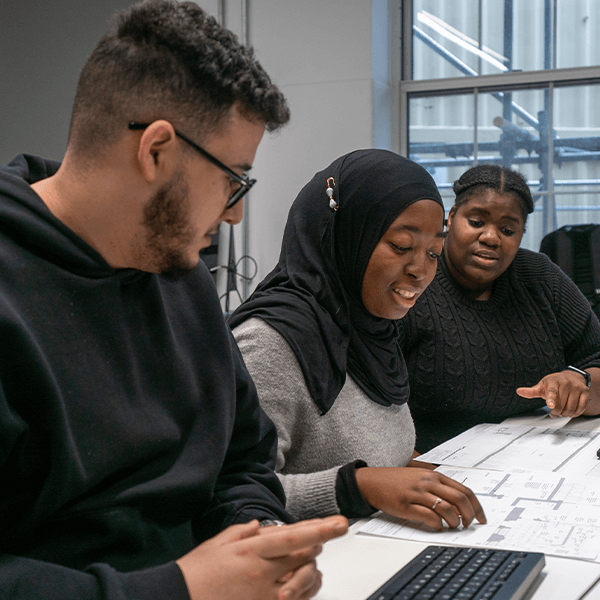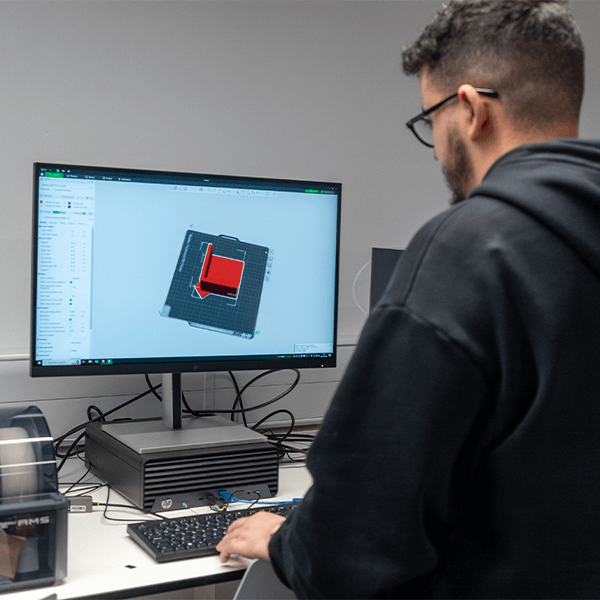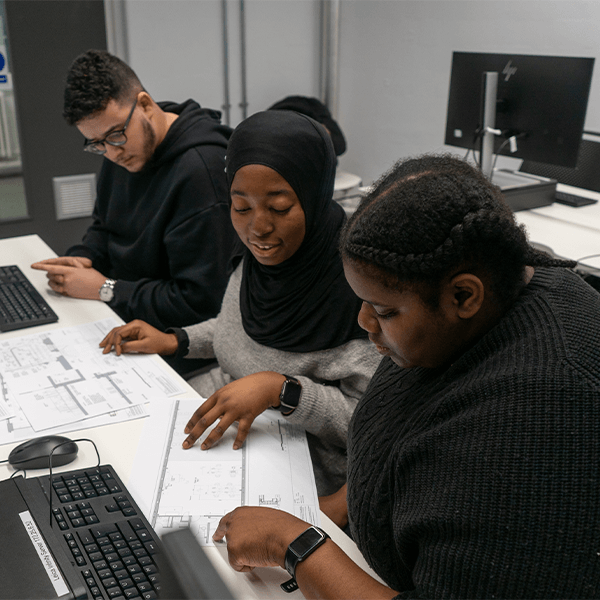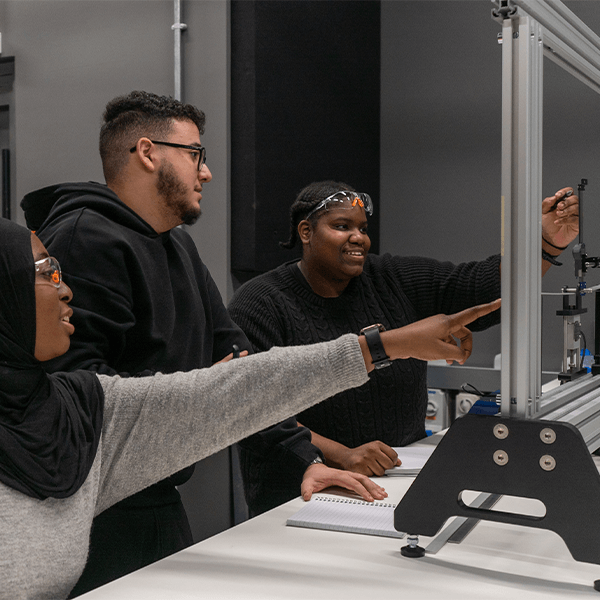/ Postgraduate Taught /
Start date:
September 2025
Duration:
1 year (full-time)
Please add an additional year if undertaking the Professional Experience Year: integrated 2-year masters
Number of credits:
MSc: 180 credits at level 7
PGDip: 120 credits at level 7

Postgraduate, Master's and Doctoral On Campus Open Day
Saturday 10 May 2025
Unlock your future in engineering and project management, with a course that focuses on sustainable practice, and positive social impact. It will give you the opportunity to enter a rapidly expanding market!
Did you know?
The Engineering Project Management programme has been designed to meet the accreditation standards of the Association for Project Management (APM) qualification.
With a growing awareness of environmental issues, sustainability has become a crucial aspect of this course. This involves planning and executing projects in a way that minimise environmental impact and promotes resource efficiency.
The MSc in Engineering Project Management has been developed as a result of a partnership between the Sustainable Engineering and Technology department and Roehampton’s Business School. This partnership brings together a unique combination of expertise in sustainable engineering and project management. The latest innovations in engineering and project management theory and practice are combined in order to prepare students for a future career whereby they are better equipped to manage the context in which they work and can make better informed decisions.
"Studying MSc Project Management has given me skills to better understand the process of planning and executing projects in a professional way. Also how to manage a team and engage with stakeholders to facilitate a successful outcome. I'm very grateful and happy to have taken this degree." - Brenda Alcantara (MSc Project Management student 2024)
Modules
Module overview:
This module aims to equip students with advanced knowledge and skills in contemporary project management practices. It focuses on inclusive leadership, strategic alignment, global orientation, professional education, and the application of modern project management methodologies in various sectors.
It seeks to raise students’ awareness of the issues emerging from project management research and practice worldwide and developing an understanding of the requirements for the leadership essential to manage corresponding changes in the conduct of projects. The key themes that drive this module support a holistic understanding of factors that influence project management today. Students will develop critical-thinking skills to engage in topical debates.
Students will be exposed to current issues from a range of academic and professional literature whereby they will analyse in depth an issue that resonates in a specific scenario. There will be opportunity to critically evaluate the arguments and employ critical-thinking and analytical skills to challenge traditional approaches to and standards in project management.
How you'll learn:
The teaching delivery on this module consists of 1 x 1 hour lecture and 1 x 3-hour workshop per week.
The lectures will be developed around the key concepts and frameworks used in contemporary project management and as mentioned in the indicative course content and will use a range of examples and cases from business practice and society to demonstrate the application of concepts.
The seminars will concentrate on the application of key ideas and concepts through the selection of contemporaneous case studies which are based on different industries and sectors.
Module overview:
As engineering professionals, you will need to integrate sustainability into your decision making process and this module will equip you with the knowledge, analytical tools and critical thinking skills necessary to assess and implement sustainable engineering solutions.
You will explore core sustainability concepts, including the triple bottom line, life cycle assessments (LCAs), and environmental impact assessments (EIAs), as well as practical applications in areas such as low-carbon materials, renewable energy, sustainable water management, and circular economy principles. Emphasis is placed on standards and certification systems (eg BREEAM, LEED, Passivhaus), regulatory frameworks, and industry best practices.
By critically evaluating the economic, social, and environmental impacts of engineering projects, you will develop the ability to assess sustainability performance using established methodologies and propose alternative solutions that enhance environmental outcomes.
You will also examine the future of sustainability, with the increasing impact of climate change and inevitability of the increase in regulation, anticipating emerging challenges and the role of engineers in shaping a more sustainable world.
How you'll learn:
This module consists of lectures, seminars and small group tutorials. The learning will be authentic, and problem based, promoting active learning. Lectures provide conceptual frameworks around sustainability and assessment methodologies, whilst seminars encourage group discussions, problem solving exercises and applied coursework activities.
Module overview:
This module will provide you with an interdisciplinary exploration of innovation management, technology development, and entrepreneurship within an engineering context. It is designed to equip you with the strategic and practical skills necessary to drive innovation, working collaboratively in a team.
The module covers the management of technological innovation and new product development, and the entrepreneurial process, demonstrating how engineering solutions are successfully commercialised. You will engage with key concepts such as business model development, value creation, sustainability, financial planning, intellectual property, and risk management. You will also examine human factors, branding, and user experience as integral components of successful engineering innovations.
This module integrates experiential learning pedagogy and research-informed teaching by engaging students with real-world case studies, industry-led projects, and applied problem-solving activities. Effective collaborative working, good communication skills, and the ability to think outside the box are essential skills you will develop, enhancing your employability.
How you'll learn:
This module consists of lectures, seminars and experiential learning activities. Lectures provide conceptual frameworks, whilst seminars encourage group discussions, problem solving exercises and applied coursework activities.
A key feature of this module is its integration of research-informed teaching and experiential learning pedagogy, ensuring that you engage with: real world engineering case studies; industry collaboration; guest speakers; workshops and feedback sessions; and structured formative assessment activities.
Module overview:
This module requires you to work on a contemporary research project which strikes a balance between academic research and real-world problem-solving, ensuring you will develop the qualitative and quantitative research skills needed for the industry, whilst also improving communication skills and the use of technology.
How you'll learn:
You will be guided in the process of research from a social science perspective and research methods, which will be taught through lectures and small group workshops. The research project is based on independent research and learning, guided by academic supervision. There will also be opportunities for peer learning and formative feedback.
Please note, these modules may be subject to change.
Professional Experience Year
This course also offers the option of a Professional Experience Year. This programme combines dynamic career modules with flexible placement opportunities. After completing your first year of study, you'll then complete a full year of Professional Experience training as part of your degree. This will give you real career experience. This unique opportunity offers you distinct paths to build your expertise.

Skills
Take your place in the growing engineering community.
All our programmes are designed with sustainability at the centre, helping to embrace the significant challenges required to meet net-zero emissions targets.
You’ll be taught engineering-focused experimental modules in the Sustainable Engineering and Technology Education Centre (SETEC) by leading practitioners and academics with the latest equipment.
You’ll focus on the core project management subjects in Roehampton’s Business School, that will help support your appreciation of methodologies.
Learning
Get ready to tackle engineering and project management head-on.
The combination of engineering and project management will prepare you to make better informed decisions in an engineering environment and in project related activities.
Our MSc Engineering Project Management degree will give you the latest engineering practice and project best thinking, including agile methodologies and risk management.

Assessment
You’ll be assessed using a combination of strategies, including:
- Submission of reports
- Essays
- Open and closed book tests
- Online assessments
- Oral presentations
Careers
With an MSc Engineering Project Management degree from Roehampton, you’ll have the skills to move into more managerial roles and engage in project management decision making, relevant activities and deliver large projects.
Whatever your aims or aspirations, our dedicated careers support team will be on hand to support you from day one, with personal coaching, CV and application writing, presentation practice, mock interviews, and networking opportunities.

Open days
Get a real taste of our campus, community and what it’s like to study at Roehampton
Applying
UK postgraduate students apply through our direct application system.
General entry requirements
September 2025 entry tuition fees (UK)
| Level of study | Full-time |
| MSc | £11,250 Professional Experience Year: £2,500 |
We offer a wide range of scholarships and bursaries. See our financial support pages for UK students.
We also provide other ways to support the cost of living, including free buses and on-campus car parking, hardship support and some of the most affordable student accommodation and catering in London. Find out more about how we can support you.
International postgraduate students apply through our direct application system.
General entry requirements
September 2025 entry tuition fees (international)
| Level of study | Full-time |
| MSc | £18,250 Professional Experience Year: £2,500 |
We offer a wide range of scholarships and bursaries. See our financial support pages for international students.
We also provide other ways to support the cost of living, including free buses and on-campus car parking, hardship support and some of the most affordable student accommodation and catering in London. Find out more about how we can support you.






